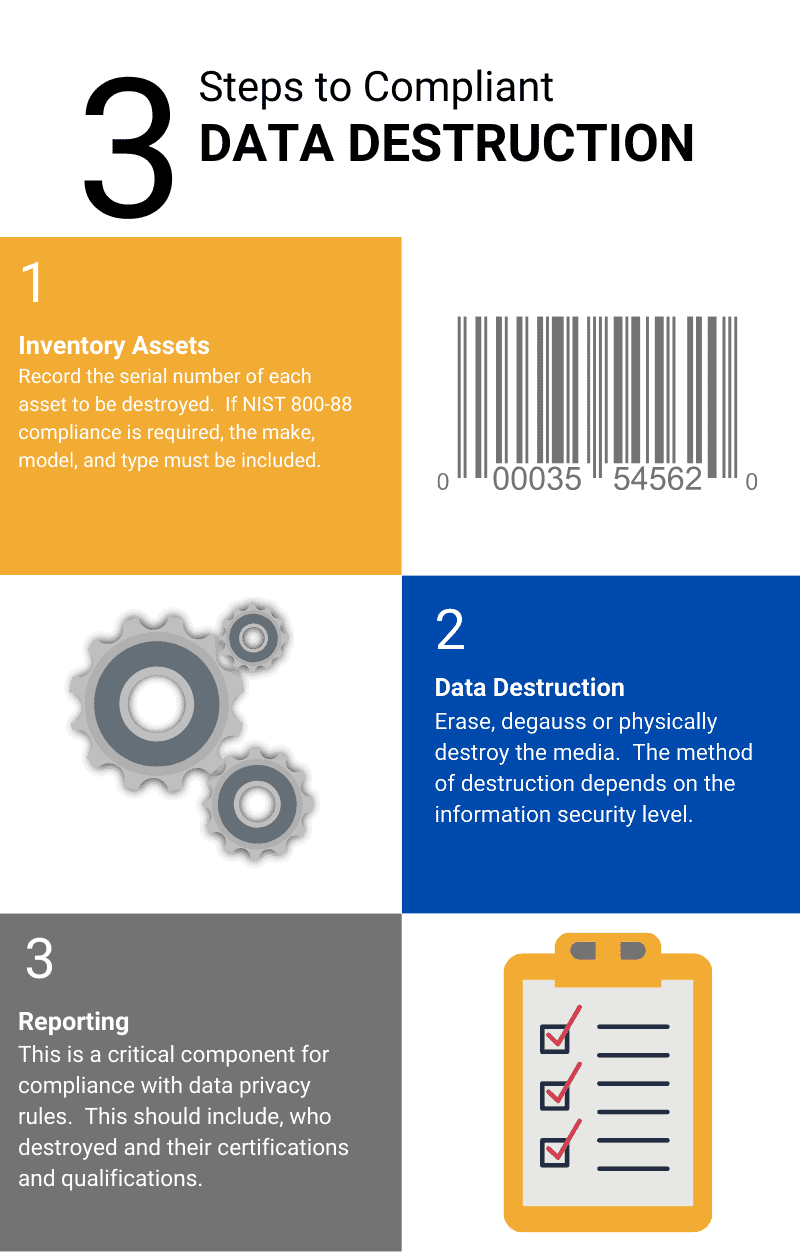The Essential Nature of Information Destruction in Upholding Computer Protection Providers and Protecting Against Unauthorized Gain Access To
In a period where data violations and identification theft are progressively widespread, the value of efficient data destruction can not be overstated. Different techniques, from information wiping to physical devastation, offer as essential safeguards versus unauthorized accessibility.
Relevance of Information Destruction
In a progressively digital world, the importance of data devastation can not be overemphasized. As companies generate huge quantities of sensitive information, the possible consequences of falling short to effectively handle and dispose of that data become progressively extreme. Data breaches, identification theft, and corporate reconnaissance present considerable threats, emphasizing the requirement of reliable data damage practices.

Furthermore, as modern technology evolves, so too do the methods through which destructive actors look for to make use of delicate information. Organizations should continue to be watchful and aggressive in their information destruction strategies to safeguard against these evolving dangers. By prioritizing data destruction, firms not only secure their properties yet additionally foster depend on amongst stakeholders and clients, demonstrating a commitment to accountable information administration and security methods.
Approaches of Effective Information Devastation
To guarantee the irreversible and complete devastation of delicate information, organizations can use a variety of efficient techniques tailored to their certain requirements. Among the most common approaches is data wiping, which involves making use of specialized software application to overwrite existing information several times, making healing virtually difficult. This is particularly valuable for hard disk drives and solid-state drives, where conventional deletion approaches are insufficient.
Another reliable strategy is degaussing, which makes use of solid magnetic areas to interfere with the magnetic domains on storage media, rendering the information irretrievable. This technique is especially suited for magnetic storage space gadgets, such as tape drives and hard drives.
Physical destruction is also a sensible choice, including the shredding, squashing, or incineration of storage devices. This method assurances that data can not be recuperated, making it perfect for organizations dealing with extremely sensitive information.

Conformity With Data Security Rules
Organizations must not just focus on reliable information destruction techniques however likewise make sure conformity with information defense guidelines that control exactly how delicate info is dealt with and dealt with. Sticking to these guidelines is vital for keeping and guarding personal information consumer trust. Rules such as the General Data Defense Law (GDPR) in the European Union and the Medical Insurance Portability and Liability Act (HIPAA) in the United States enforce stringent guidelines on data administration, that include demands you can look here for the secure disposal of sensitive details.
To achieve compliance, companies need to implement extensive data damage policies that align with these legal frameworks. This includes recognizing data that requires damage, developing procedures for safe methodsâEUR" such as shredding physical media or using software program that meets market criteria for data wipingâEUR" and keeping in-depth documents of devastation tasks. Regular audits ought to be performed to make sure adherence to these plans and to determine any type of possible locations for renovation.
Failing to conform with information security policies can bring about considerable legal ramifications, consisting of large penalties and damages to an organization's reputation. As a result, integrating conformity right into data devastation techniques is not just a legal commitment yet additionally an essential element of a robust information protection technique.
Repercussions of Poor Data Handling
Poor data handling can result in severe consequences that prolong past prompt operational problems. Organizations might deal with substantial economic losses Continued because of information violations, which frequently result in costly remediation initiatives, legal fees, and regulative fines. These monetary effects can prevent and stress sources development, inevitably impacting a company's profits.
Additionally, inadequate information handling can seriously damage a company's credibility. Companions, stakeholders, and consumers may shed rely on an entity that fails to secure sensitive information, leading to lowered consumer loyalty and prospective loss of business chances. This erosion of trust can take years to rebuild, if it can be brought back whatsoever.
In addition, organizations can encounter legal implications occurring from non-compliance with information defense regulations. Such offenses might lead to investigations and charges, compounding the economic problem and further tarnishing the company's picture.
In the world of cybersecurity, inadequate data administration methods can create vulnerabilities that make systems a lot more at risk to unauthorized access and cyberattacks. Inevitably, these consequences highlight the critical significance of applying durable data managing procedures to secure delicate info and keep business stability.
Ideal Practices for Secure Information Disposal


To start with, data need to be identified according to its sensitivity. Delicate info needs more extensive disposal techniques, such as shredding physical documents and making use of advanced software for digital information wiping. Using licensed information damage services makes sure compliance with industry regulations and criteria.
Secondly, companies should implement a data disposal policy that mandates regular audits. This policy should detail the treatments for data retention and damage, guaranteeing that outdated information is taken care of promptly and safely. Educating staff members on these protocols is important to fostering a culture of safety and security recognition.
Last but not least, keeping thorough records of disposed data enhances liability and offers a clear audit trail. This documents must consist of the sort of information ruined, the approach used, and the date of disposal.
Verdict
To conclude, the imperative of reliable information devastation appears in its function in boosting computer protection solutions and mitigating unapproved accessibility risks. Adopting robust techniques such as data wiping, degaussing, and physical damage, alongside compliance with guidelines like GDPR and HIPAA, is vital for safeguarding delicate info. Disregarding proper information disposal practices can bring about serious effects, including information violations and legal effects. Applying ideal practices in protected information disposal eventually strengthens organizational stability and customer trust fund.
In an age where information violations and identification burglary are significantly prevalent, the significance of effective data destruction can not be overemphasized. data destruction. Information breaches, identification burglary, and business reconnaissance posture considerable hazards, underscoring the requirement of reliable data damage practices
Conformity with policies such as GDPR and HIPAA mandates that organizations implement rigorous information protection procedures, including the safe destruction of data at the end of its lifecycle.
By focusing on data destruction, business not only secure their assets but additionally foster count on among customers and stakeholders, demonstrating a dedication to accountable data management and safety methods.
Organizations have to not only focus on effective data devastation approaches yet additionally make sure conformity with information security laws that control exactly how delicate details is handled and disposed of.
Comments on “Optimizing Cyber Security through Advanced Data Destruction Techniques”